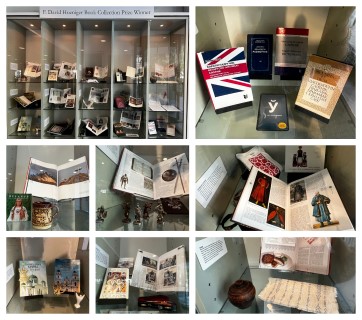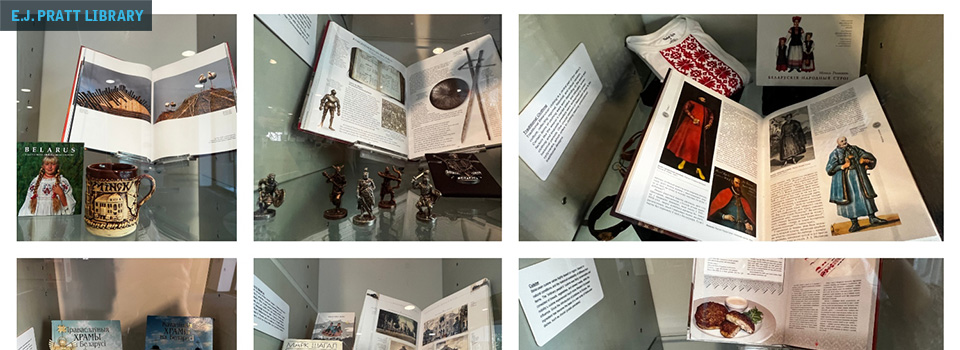Hoeniger Book Collection Prize 2023
Belarusian History
Viktar Yakauleu
Hoeniger Book Prize Winner 2023
Viktar Yakauleu is a second year student in Mathematical Applications in Economics and Finance at the University of Toronto.
The physical exhibition is available at the Front Foyer of the E.J. Pratt Library until October 31, 2023.

Collection Statement
I was born in Minsk, Belarus. Despite the fact that my family and I immigrated to Canada when I was very young, Belarusian culture remains one of the central elements of my identity.
My father, since he was young, has always had a passion for history and culture. In Belarus, he spent most of his free time researching the country’s history, and visiting castles, ruins, and historical sites. My father taught my mother and me, since I was young, to appreciate and value my background and the long history of my country of origin, as well as the importance of preserving it for future generations.
The first few books in my collection, mostly about the history of Belarus, were gifted to me by my father. Since then, I have come across various books on different areas of Belarusian culture, which I have collected. My collection partially reflects another interest of mine, which is languages and linguistics, as can be seen through the dictionaries and related material on the list.
Another goal of my collection is to preserve these books for the future. Since 1994, and even more so since 2020, an exorbitant number of historians, writers, linguists, and other respectable individuals have either been imprisoned or forced to leave the country due to political persecution. Their works, together with the publishing houses that allow for their production, have been banned by the government for not convening to the ever-changing ideology of the dictatorial regime in the country.
In 2020, the government organized a presidential election. In summary, all of the major opposition candidates were either imprisoned or expelled from the country before Election Day. One of these candidates was replaced by his wife, whom the government allowed to participate in an attempt to humiliate her due to her lack of political experience. Nonetheless, she proceeded to win the election according to independent statistics, which did not match the 80% landslide victory of the current dictator announced by the government a few days later. Since then, political persecution and government crackdowns in Belarus have become much more prevalent and limitless.
Belarusian history is quite ancient and impressive, with Belarus, under other names, being a civilized and advanced nation, which valued freedom and democracy, and was always an integral part of Europe. The current government of Belarus, however, is attempting to rewrite history and culture against these interests. It does so in an attempt to show Belarus as a little Russia, artificially created by Lenin. However, it cannot do this with independent literature existing in the country. Government-standardized textbooks, which are used to "replace" this literature, are re-written very frequently in order change history to promote the current ideology of the state through the re-labeling of historical events and the omission of entire periods, which contradict the values of today's regime. For this reason, and especially since the mass protests of 2020, books that objectively describe the true history and culture of the country are labeled "extremist literature," a title with which possession, production, and any other contact with these books becomes an arrestable offence. In fact, this is now occurring at such a pace that by the time I received a package of books from Belarus, the publishing house that printed them had already been banned in the country. Due to this persecution and other related reasons, some of these books are printed in very small numbers, and others have become difficult to come by. Many attempt to save these books by somehow shipping them to Poland, which is also where many of the banned publishing houses have re-opened. Therefore, collecting these books alone is a critical task in preserving the culture and history of my country of origin for future generations.
Books in the Collection
Archipava, V. A., et al. 500 Masterpieces. The National Art Museum of the Republic of Belarus. Translated by T. A. Asadčanka. Minsk, Mastackaja Litaratura, 2017.
Alaksiejeŭ, Alaksandr Alaksiejevič, and Aleh Vaclavič Łukaševič. Heritage of Belarus. Minsk, Minskaja Fabryka Kalarovaha Druku, 2007.
Alaksiejeŭ, Alaksandr Alaksiejevič, and Aleh Vaclavič Łukaševič. Heritage of Belarus: Treasures. Minsk, Minskaja Fabryka Kalarovaha Druku, 2007.
Arłoŭ, Uładzimir, and Pavieł Tatarnikaŭ. Ajčyna: Ad Rahnieda da Kaściuški. Malaŭničaja historyja [Heritage: From Rahnied to Kaściuška. An Illustrated History]. Minsk, Technalohija, 2016.
Arłoŭ, Uładzimir, and Źmicier Hierasimovič. Belarus: The Epoch of the Grand Duchy of Lithuania: An Illustrated History. Translated by Jim Dingley. Minsk, Technalohija, 2018.
Arłoŭ, Uladzimir, and Źmicier Hierasimovič. This Country Called Belarus: An Illustrated History. Translated by Jim Dingley. Minsk, Kalligram, 2003.
Białavina, Valancina Mikałajeva, and Luboŭ Vasilijeŭna Rakava. Biełaruski Kaścium [Belarusian Dress]. Minsk, Belarus Publishing House, 2017.
Bułyka, A. M. Karotki Histaryčny Sloŭnik Biełaruskaj Movy [A Short Historical Dictionary of the Belarusian Language]. Biełaruskaja Navuka, 2015.
Butevič, Anatol, and Uładzimir Yahoŭdzik. Na Dałoniach Viečnaści: Siem Cudaŭ Biełarusi [On the Palms of Eternity: Seven Wonders of Belarus]. Minsk, Kavalier, 2010.
Hančarova, N. A., et al. Proverbia et Dicta: Šascimoŭny Słoŭnik Prykazak, Prymavak i Kryłatych Słoŭ [Proverbia et Dicta: A Six-Language Dictionary of Sayings, Idioms, and Popular Expressions] . Minsk, Univiersiteckaje, 1993.
Karatkievič, Uladzimir. King Stakh’s Wild Hunt. 1950-1958. Translated by Mary Mintz. Yunatstva Publishers, Minsk, 1989.
Karatkievič, Uladzimir. The Land Beneath White Wings. Translated by Apollo Weise and Walter May. Mastackaja Litaratura, Minsk, 1977.
Kazłoŭ, Leŭ Ramanavič. Stahoddzi na Kartach [The Centuries in Maps]. Minsk, Biełaruskaja Navuka, 2021. Łakotka, Alaksandr Ivanavič. Nacyjanalnyja Rysy Biełaruskaj Architektury. Minsk, Uradžaj, 1999.
Michaś Ramaniuk. Belarusian National Dress. Minsk, Dzianis Ramaniuk, 2003.
Michnievič, A. J., and N. M. Navičenka. English-Byelorussian Phrasebook. Minsk, Navuka i Technika, 1992.
Mikulčyk, Alena. Taste of Belarusian History. Translated by Alena Pamierancava. Minsk, Belarus Publishing House, 2022.
Paškievič, Valentyna. English-Belarusian Dictionary. Minsk, Belarusian Institute of Arts and Sciences, Źmicier Kołas, 2006. Tkačoŭ, Michaś Alaksandravič. Zamki I Ludzi [Castles and People]. Minsk, Navuka I Technika, 1991.
Vaščanka, Alaksandr Piatrovič. Belarusian Cuisine. Minsk, A. V. Bykava, 2022.
Last updated: December 11, 2024
 Ask Us
Ask Us
